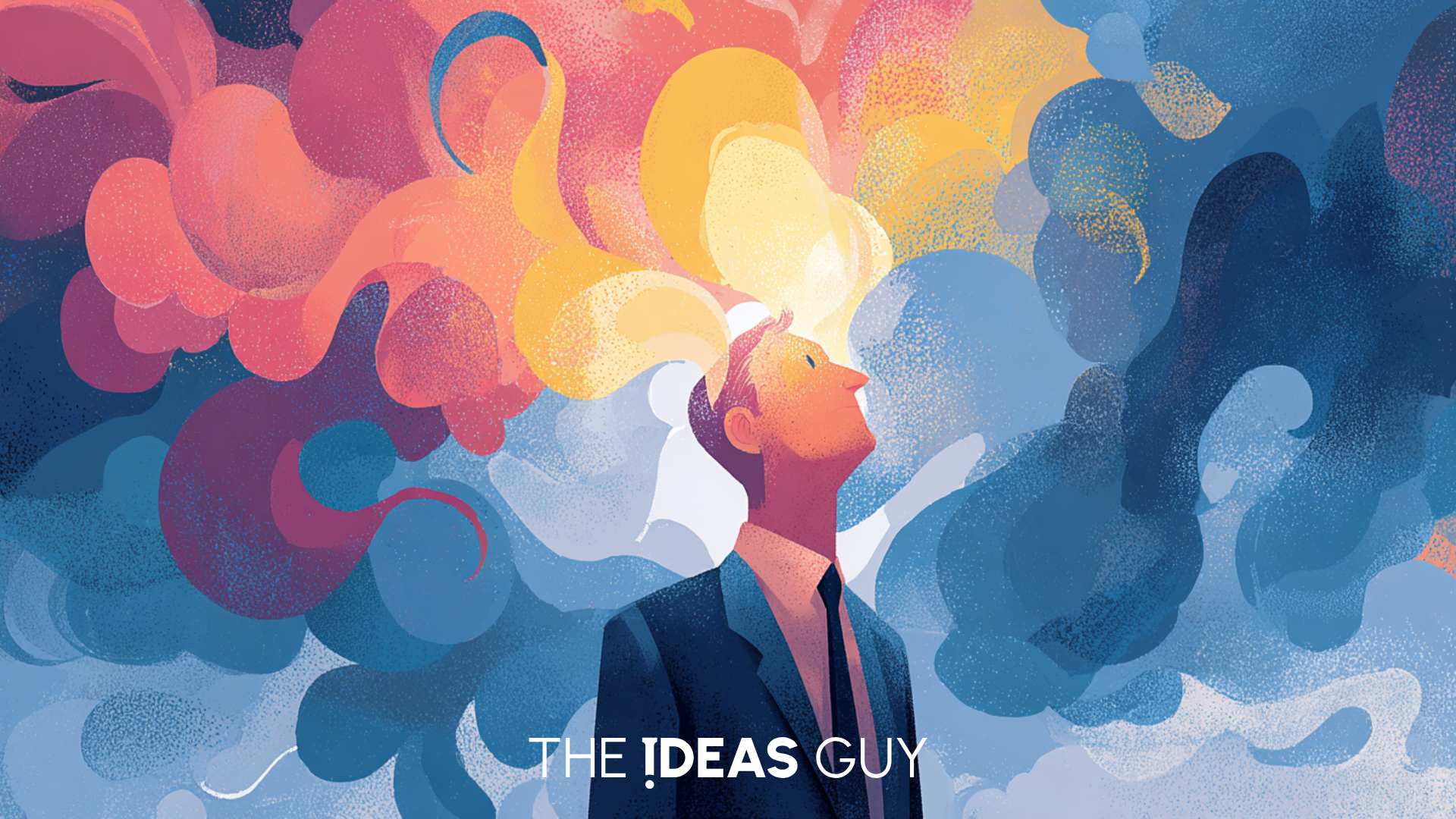Kasabian took the stage at TruckFest 2025. Within three songs, I felt that familiar pang of disappointment. I'd never seen them live before, but their reputation preceded them - festival legends, crowd-pleasers, the kind of band you're supposed to get excited about. Yet somehow this felt flat, predictable, almost perfunctory. The Courteeners followed a day later with a similar result; all the hype, none of the magic. Meanwhile, in a cramped tent across the site, Cheap Suits - a band I'd never heard of - were absolutely tearing the roof off with their guerrilla-marketed set, exceeding every expectation I didn't even know I had.
The contrast was striking, but not unusual. We've all been there: the highly anticipated film that leaves us cold, the restaurant everyone raves about that somehow underwhelms, the meeting that promised innovation but delivered the same tired talking points. Conversely, we've all experienced those delightful surprises - the book recommended by a stranger, the conversation that started as small talk but became profound, the risky decision that paid off spectacularly.
What's happening here isn't just about subjective taste or random chance. It's about one of the most powerful yet poorly understood forces shaping our experience: the psychology of expectations. How we anticipate events doesn't just influence our preparation for them; it fundamentally alters our perception of reality itself. And in our hyperconnected, review-saturated, perpetually previewed world, understanding this dynamic has become essential for anyone trying to lead change, deliver results, or simply navigate life with greater satisfaction.
The Neuroscience of Anticipation
Our brains are prediction machines, constantly generating models of what's likely to happen next based on past experience and current context. This isn't just passive forecasting, it's active reality construction. When neuroscientist Anil Seth describes consciousness as a "controlled hallucination," he's pointing to something I think is profound: our experience of reality is heavily shaped by what our brains expect to encounter.
“It may seem as though the self - your self - is the “thing” that does the perceiving. But this is not how things are. The self is another perception, another controlled hallucination, though of a very special kind.” Anil Seth
The neurological evidence is compelling. Brain imaging studies show that when we anticipate an experience, the same neural regions activate as when we actually have that experience. If you're expecting a delicious meal, your brain's reward centres light up before you've taken a single bite. If you're dreading a difficult conversation, your stress response begins firing long before you've said a word.

This predictive processing serves crucial evolutionary functions, it allows us to prepare for threats and opportunities before they fully materialise. But it also creates a peculiar psychological reality. We don't just experience events, we experience the gap between what we expected and what actually occurred. The disappointment I felt watching Kasabian wasn't really about their performance - it was about the mismatch between the spectacular show I'd constructed in my mind and the competent but unremarkable reality unfolding on stage.
Daniel Kahneman captured this dynamic in his research on "adaptation level theory." We don't judge experiences in absolute terms but relative to our expectations. A £20,000 salary feels generous to a recent graduate but insulting to a senior executive. The same hotel room delights when booking a budget stay but disappoints when expecting luxury. The objective reality matters less than the subjective gap between anticipation and actuality.
The Expectation Economy
This psychological reality has profound implications for how we think about value creation in the modern economy. We're not just competing on objective quality anymore, we're competing on expectation management. The most successful brands, leaders, and experiences understand this distinction and design accordingly.
A company like Ryanair has built an empire not by delivering exceptional experiences but by carefully managing expectations. Their brand promise is essentially "cheap flights with minimal fuss" - and they deliver exactly that. Passengers who might be outraged by cramped seats on British Airways often feel satisfied on Ryanair because they got precisely what they expected: transport from A to B at rock-bottom prices.
This contrasts sharply with companies that overpromise and underdeliver. The most spectacular business failures often aren't about poor products but about unrealistic expectations. Take Google Glass, the technology itself was remarkable, but Google positioned it as the future of computing rather than an experimental prototype. When the reality of battery life, privacy concerns and social awkwardness met the expectations of seamless augmented reality integration, the disappointment was crushing enough to shelve the entire consumer project.
Now, interestingly, this huge failure perhaps wasn’t an issue of product but timing as per some of the recent developments like Meta Ray-Bans.
The hospitality industry has mastered this dynamic through sophisticated expectation engineering. Luxury hotels don't just provide better amenities, they carefully orchestrate the entire anticipation journey. From the booking process to arrival, they create expectations that are ambitious enough to feel special but achievable enough to be consistently exceeded. The result is customer satisfaction that has as much to do with psychological architecture as physical comfort.
In education, we see similar patterns. Schools that communicate clearly about their approach and limitations often achieve higher parent satisfaction than those that make grand promises they can't keep. A school that honestly positions itself as "rigorous academics with high expectations" can exceed parents' hopes more easily than one that claims to be "transforming every child's life" - even if the latter has more resources.
The challenge for leaders in any sector is learning to set expectations that are simultaneously inspiring and achievable. Too low, and you lose excitement and engagement. Too high, and you guarantee disappointment regardless of actual performance.

The Paradox of Positive Thinking
This understanding of expectations creates an uncomfortable challenge for the positive thinking industry. We're constantly told to "visualise success," "think big," and "manifest our dreams." But psychological research suggests that excessive positive expectations can actually undermine performance and satisfaction.
Psychologist Gabriele Oettingen's research on positive fantasies reveals a counterintuitive truth: people who vividly imagine achieving their goals often perform worse than those who couple positive visions with realistic obstacle planning. The mechanism seems to be that overly rosy expectations reduce the motivation to put in necessary effort - our brains partially satisfy themselves with imagined success rather than pursuing actual achievement.
“Are job-seekers more likely to find work if they visualise themselves as future CEOs, or question whether they really will attain the ideal position? Do lovesick teens realise more romantic success when they picture themselves walking down the aisle toward their crush, or imagine themselves awkwardly stuttering as they invite him on a study date? Although it is tempting to believe that simple positive visions engender actual success, research finds something different. Specifically, fantasies that are experienced as positive – those that depict an idealised version of future events – are associated with poor achievement.” Gabriele Oettingen
This doesn't mean pessimism is better than optimism. Rather, it suggests that the most effective approach involves what Oettingen calls "mental contrasting" - visualising desired outcomes alongside honest assessment of likely challenges. This creates what she terms "energising" expectations rather than "depleting" fantasies.
The implications extend beyond individual psychology into organisational leadership. Teams that engage in realistic scenario planning alongside ambitious goal-setting often outperform those that rely purely on positive thinking. They maintain motivation while avoiding the crushing disappointment that comes when reality fails to match unrealistic hopes.
We can see this in the difference between two approaches to launching a new initiative. The first involves enthusiastic speeches about transformation and revolution, painting vivid pictures of success without acknowledging potential obstacles. The second combines inspiring vision with honest discussion of likely challenges and setbacks. The latter approach may seem less exciting initially, but it tends to produce more sustainable engagement and better actual results.
Cultural Variations in Expectation
The psychology of expectations isn't universal, it's heavily influenced by cultural context. Understanding these variations becomes crucial as we operate in increasingly globalised environments.
Research comparing expectation patterns across cultures reveals fascinating differences. Japanese business culture, influenced by concepts like kaizen (continuous improvement), tends to set modest expectations that can be consistently exceeded. This creates a psychological environment where small gains feel significant and setbacks feel manageable.
American business culture, by contrast, often emphasises "thinking big" and "disrupting industries" - creating higher baseline expectations but also greater volatility in satisfaction when results don't match ambitions. Silicon Valley's "fake it ‘til you make it" ethos exemplifies this approach, with its combination of spectacular successes and equally spectacular failures.

British culture occupies an interesting middle ground, characterised by what might be called defensive expectations to play with Oettingen’s vernacular. We're culturally conditioned to expect disappointment - "it'll probably rain," "the trains will be delayed," "they'll mess it up somehow." This pessimistic baseline actually serves a protective function, making positive surprises more frequent and negative outcomes less devastating. But we do love a queue and a sandwich…
However, this cultural pessimism can become self-limiting in contexts requiring bold action or ambitious thinking. British entrepreneurs often struggle in Silicon Valley precisely because their culturally conditioned expectation management feels like a lack of vision to investors accustomed to grandiose promises.
The key insight is that effective expectation management requires cultural fluency. What feels realistic in one context may seem uninspiring in another. Leaders operating across cultures need to develop sensitivity to these different expectation norms and adapt their communication accordingly.
The Digital Amplification Effect
Again, as with many of the issues I write about in these articles, social media and digital platforms have dramatically amplified both the creation and consequences of expectations. We're constantly exposed to curated highlights of others' experiences, creating what researchers call "compare and despair" dynamics that elevate our baseline expectations for everything from holidays to career progress.
Instagram doesn't just show us pictures - it shapes our expectations about what experiences should look like. TripAdvisor reviews don't just inform our choices - they pre-program our emotional responses to places before we arrive. LinkedIn updates don't just share professional news - they create pressure for our own careers to match impossible standards of continuous achievement.
This digital amplification creates what psychologist Tim Kasser calls "materialistic value orientation"; the tendency to judge experiences primarily by how they'll appear to others rather than their intrinsic satisfaction. We stop asking "Will this make me happy?" and start asking "Will this look impressive?"
"...decades of research on the closely-related field of intrinsically vs. extrinsically motivated activities have shown that the feelings of flow, creativity, play, interest, and curiosity that characterize [sic] intrinsically motivated activity can be undermined when people become focused on extrinsic factors such as rewards, awards, and how one looks to others. Such studies are another way of documenting the fundamental opposition between intrinsic and extrinsic motivation that is reflected in the circumplex. But if extrinsic rewards can undermine intrinsic pursuits, it might also be that intrinsically oriented, flow-conducive activities like arts and culture can suppress a strong focus on extrinsic concerns." Tim Kasser
The result is expectation inflation across multiple domains. Restaurant meals are expected to be Instagram-worthy. Holiday destinations must provide social media content. Career moves are judged not just by personal satisfaction but by their storytelling potential on professional networks. This creates exhausting pressure to constantly exceed ever-rising expectations while simultaneously making genuine satisfaction harder to achieve. When every experience is pre-judged against impossibly curated standards, even objectively good experiences can feel disappointing.
Strategic Expectation Management
Understanding these dynamics suggests several practical approaches for managing expectations more strategically, whether in personal life, professional contexts, or organisational leadership.
The first principle is clarity over excitement. It's tempting to build enthusiasm through grand promises, but sustainable satisfaction comes from delivering consistently on clearly communicated commitments. This applies whether you're planning a family holiday, launching a product, or implementing organisational change.
The second principle involves what we might call expectation inoculation - helping people understand likely challenges before they occur. Military training exemplifies this approach, preparing soldiers for difficult realities rather than painting rosy pictures of heroic adventure. The result is greater resilience when difficulties arise.
The third principle is creating positive surprises through deliberate under-promising. This doesn't mean being dishonest or unambitious, but rather communicating conservatively about timelines, outcomes, and experiences while working to exceed those stated expectations.
Amazon has mastered this approach with their delivery estimates. They routinely promise that packages will arrive "within 3-5 days" then deliver in 2 days, creating consistent positive surprises that build customer loyalty. The actual service quality remains the same, but the psychological experience is enhanced through expectation management.
The fourth principle involves helping others develop meta-expectations - awareness of how their expectations are being shaped and the ability to adjust them consciously. This might involve discussing how social media creates unrealistic standards, or how past experiences might be creating inappropriate comparisons.

This focus on expectation management raises an important ethical question: when does strategic expectation setting become manipulation? There's a fine line between helping people have realistic expectations and cynically lowering their aspirations to make your job easier. The distinction seems to lie in intent and transparency. Authentic expectation management aims to align anticipations with likely realities in service of better outcomes for everyone involved. Manipulative expectation management seeks to lower standards in service of the expectation-setter's convenience.
Authentic approaches involve honest communication about both possibilities and probabilities. They acknowledge uncertainty while providing people with realistic frameworks for thinking about likely scenarios. They focus on helping people succeed rather than protecting organisations from accountability.
Manipulative approaches involve selectively emphasising negative possibilities to reduce accountability, or creating false urgency to pressure quick decisions. They prioritise short-term convenience over long-term trust and satisfaction.
The challenge for leaders is maintaining this authenticity while still providing the clarity and confidence people need to move forward. It requires real emotional agility - the ability to hold multiple truths simultaneously without becoming paralysed by complexity, something I talk about in my book.
Learning from Disappointment
Perhaps most importantly, understanding the psychology of expectations helps us develop a healthier relationship with disappointment itself. Rather than viewing unmet expectations as failures, we can begin to see them as information - data about the accuracy of our predictions and the appropriateness of our hopes.
This reframing transforms disappointment from an enemy to be avoided into a teacher to be consulted. When Kasabian failed to meet my expectations, the disappointment contained useful information: perhaps my expectations were based more on reputation than evidence, perhaps I was looking for experiences that can't be replicated, perhaps I need to approach live music with more curiosity and less predetermined judgment. Or, perhaps I shouldn’t go and see the Oasis reunion at Heaton Park with 80,000 people the week before!
The goal isn't to eliminate disappointment - that would require either perfect prediction (impossible) or the absence of hope (tragic). Instead, it's to develop disappointment resilience or the ability to learn from unmet expectations without becoming cynical about having expectations at all. This resilience comes partly from recognising that our expectations are constructions rather than predictions. They say as much about us - our past, our values, our fears, our hopes - as they do about likely futures. Treating them as hypotheses rather than prophecies allows us to hold them more lightly while still using them as guides for action.
Key Takeaways
- Recognise expectation as construction: Your expectations aren't neutral predictions but active reality-shapers that influence how you perceive and respond to experiences. Understand this power and use it consciously.
- Practise strategic under-promising: Whether in personal commitments or professional projects, consistently delivering slightly more than promised creates positive surprise and builds trust over time.
- Develop cultural expectation fluency: Different contexts and cultures have different expectation norms. Learn to read and adapt to these variations without losing your authentic voice.
- Create expectation inoculation: Help others prepare for likely challenges alongside hoping for positive outcomes. This builds resilience and reduces the shock of difficulties when they arise.
- Embrace meta-expectations: Develop awareness of how your expectations are being shaped by social media, past experiences, and cultural narratives. This consciousness allows for more intentional expectation setting.
- Transform disappointment into data: When expectations aren't met, resist the urge to blame yourself or others. Instead, treat the gap as information about prediction accuracy and expectation appropriateness.
- Balance inspiration with realism: Effective leadership requires expectations that are simultaneously motivating and achievable. This balance must be consciously managed rather than accidentally achieved.
The psychology of expectations reveals something profound about human experience: we don't just live in reality, we live in the gap between expectation and actuality. Understanding this gap, and learning to navigate it skilfully, may be one of the most practical wisdom skills for thriving in an uncertain world. The goal isn't to eliminate expectations but to hold them with appropriate lightness, using them as tools for action rather than weapons against ourselves when reality inevitably differs from our predictions.
After all, sometimes the best experiences are the ones we never saw coming - like discovering your new favourite band in a tent you wandered into by accident, with no expectations at all.
Further Reading
Discover more interesting articles here.
.png)
.png)


.jpg)